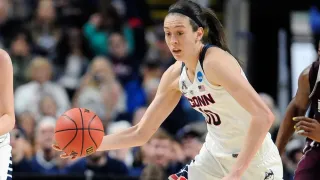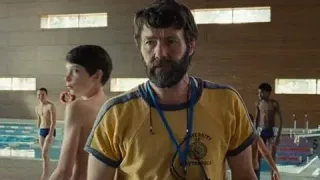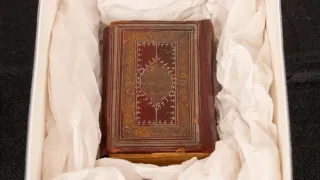May 12, 2015
Bear Encounter at Yellowstone (Not of the Grindr Variety)
Matthew Wexler READ TIME: 3 MIN.
Dramatic video captured by a Montana wildlife official shows a mother black bear with cubs running toward a knot of camera-clicking tourists as the animals try to cross a bridge in Yellowstone National Park.
No one is hurt, but at one point the adult bear rushes full-tilt toward a group of people standing at one end of the bridge. Yelling is heard as people scramble to get to their vehicles.
Montana Fish Wildlife and Parks spokesman Bob Gibson witnessed the encounter and said some visitors ignored or were slow to heed a park official's commands to leave the bridge. As the nervous-seeming cubs scattered, the mother bear raced to round them up, frightening the tourists.
"The bear was the only one doing anything right there," Gibson said. "The bear was definitely not charging at people. The bear was trying to get across the bridge, and people were in the way."
HOW SHOULD THE TOURISTS HAVE REACTED?
Each year, Yellowstone sees about 1,000 so-called bear jams, in which grizzly or black bear sightings prompt dozens and sometimes hundreds of tourists to pull over their vehicles hoping for a photo.
Ideally, the visitors on the bridge would have stayed in their vehicles, said Kerry Gunther, the park's bear management program leader.
Once the bears started approaching, the tourists worsened the situation by running and screaming, Gunther said. They instead should have grouped together on one side of the bridge and allowed the bears to pass.
Yellowstone has never had a bear-caused injury among groups of three or more people, he said.
HOW DANGEROUS ARE BLACK BEARS?
Another species of bear - the grizzly - is generally more feared because of its larger size and reputation for aggressive behavior.
However, researchers have recorded at least 63 people killed by black bears since 1900 in the U.S. and Canada.
Of those fatal attacks in which black bears exhibited predatory behavior, 92 percent involved male bears, defying the commonly held belief that females with cubs are the most dangerous bears.
WHAT ARE THE CHANCES OF INJURY?
Hundreds of bears of both species live in and near Yellowstone, making for a high potential for dangerous run-ins.
Over a three-decade period ending in 2011, black and grizzly bears injured 43 people, park officials said.
When stacked against total visitation numbers - more than 3.5 million passed through Yellowstone last year - that works out to a 1 in 2.1 million chance of a visitor getting hurt by a bear, according to the park. More often people are injured by the park's buffalo.
HOW BIG ARE BLACK BEARS?
In Yellowstone, adult male black bears can top 300 pounds, while females weigh 135 to 200 pounds. Black bears elsewhere can get much larger because of differences in their diet.
In the park, the animals live up to 30 years, surviving on elk calves, trout, pine nuts, grasses, rodents and insects.
The cubs in the bridge encounter were more than a year old, which likely worked in the tourists' favor. Their mother would have been more aggressive had she been traveling with newborns, Gibson said.
SHOOT OR SPRAY?
Some backcountry travelers carry large-caliber handguns for protection against bear attacks.
Wildlife officials say a much more effective deterrent is bear spray, which is similar to mace. It shoots out a mist of capsaicin, a form of pepper that makes an animal's eyes burn and causes trouble breathing.
WHAT IF I DON'T HAVE SPRAY?
If the bear is more than 100 yards away, wildlife officials advise people to retreat quietly and without running to avoid attracting its attention.
If the bear is within 100 yards, people are advised to slowly back away and speak to the bear so the animal can recognize that it's having an encounter with a human and not one of its typical prey species.
WHERE ELSE ARE BLACK BEARS FOUND?
The animals are widely distributed from Canada to Mexico and are found in at least 40 U.S. states, according to the advocacy group Defenders of Wildlife.






